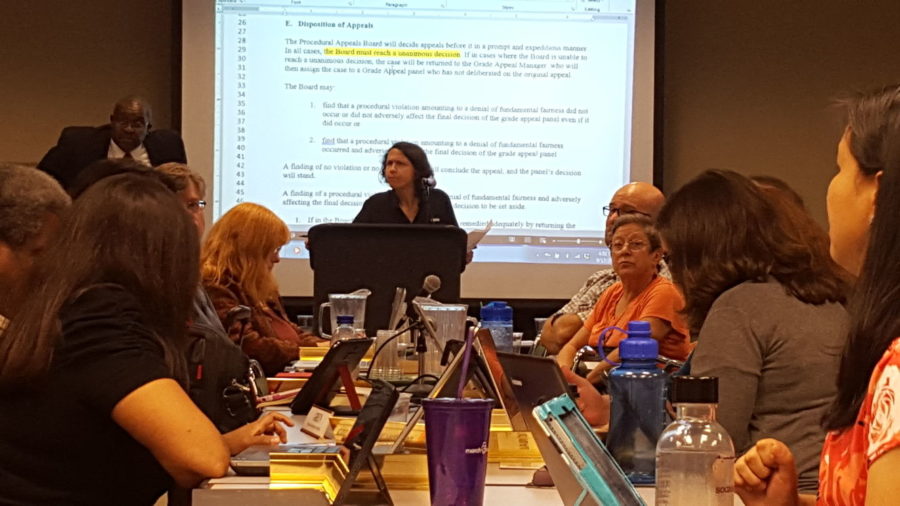Major impaction brought up at Faculty Senate meeting
Sue Escobar, pictured at center, arofessor in the Criminal Justice Division and Chair of the Academic Policies Committee presided over a question and answer session about the grade appeal process at the Thursday, September 17 Faculty Senate meeting.
September 18, 2015
Sacramento State’s Faculty Senate meeting on Sept. 18 talked about how to approach major impaction and improving the student grade appeal process.
Ted Lascher, a professor in the Public Policy & Administration Graduate Program, summarized his report on impaction at Sac State.
“When you boil it down, the basic problem is a mismatch between supply and demand,” Lascher said.
The Admissions & Outreach website describes a major as impacted when “the number of applications from fully eligible students to a designated major during the initial filing period far exceeds the number of spaces available in that major.”
Impacted majors listed on the A&O website are: biological sciences, criminal justice, graphic design, photography, health science, the upper division clinical nursing program, and psychology.
Lascher discussed alternatives to designating certain programs and degrees on campus impacted. He said setting aside reserve funds to hire faculty for programs that have had unexpected spikes in demand in the past might help.
He also said lowering demand by offering better advising earlier on for students trying to pick a major, as well as removing some classes from general education would benefit impacted programs.
“The demand for particular programs isn’t set,” Lascher said. “It’s not that we can’t affect it.”
Sue Escobar, a professor in the criminal justice division and chair of the Academic Policies Committee, gave a presentation outlining an updated and simplified grade appeal process.
In September 2013, former President Alexander Gonzalez wrote a letter to the Faculty Senate chair calling the current grade appeal process “overly complex, adversarial and legalistic.”
Escobar said the goals Gonzalez set for the improved grade appeals process: “(to) ensure fairness to both students and faculty, to simplify and speed up the process, and to make sure that language used to describe the process is clear to everyone involved.”
The current Student Grade Appeal Process document is 37 pages long. The new document should be fewer than 10 pages, Escobar said.
Also discussed at the meeting was a plan for a program called Assigned Time for Exceptional Levels of Service to Students.
De-Laine Cyrenne, a lecturer in the psychology department, gave a presentation on the program. The university would set aside a pool of $1.3 million each fiscal year to allow faculty to allocate time for student mentoring, advising and outreach.
Faculty would have to apply to be allowed to assign time from their workload to these tasks.





























































































































